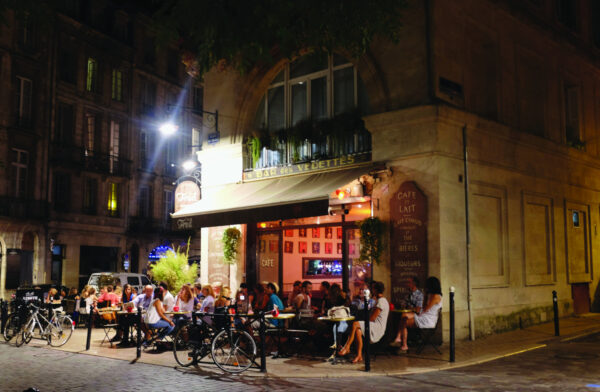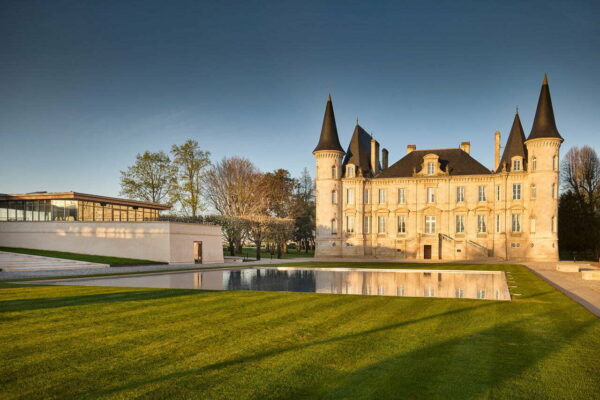The French Connection
Wine writer, Jane Anson, examines the long trading history between Britain and Bordeaux
By Jane Anson
October 17 2024
Pascal Ribéreau-Gayon was practically crowing over the page in his annual report for the Bordeaux oenology school, released in December 1989. “To finish up the 1980s, a decade full of individual successes, the 1989 vintage will leave an indelible mark in our minds.” The reason, he went on, was clear: “The early ripening and rich concentration of the berries were exceptional. Many had never seen the like before, and most will never see it again.” Ribéreau-Gayon, whose great grandfather was Ulysse Ribéreau-Gayon, Louis Pasteur’s assistant in the 19th century, was approaching the end of his teaching career at the age of 59, although, well into his 70s, he could still be found in the vineyards and cellars of top châteaux. He was one of a select number of professors and wine consultants who increasingly ruled the vineyards of Bordeaux. Rarely out of a suit and tie, dignified with remarkably well-groomed eyebrows, he had an outsized influence on the luscious, structured, long-ageing wine that Bordeaux continues to produce. Crisscrossing between research laboratories, châteaux, and lecture halls, over the previous few decades these scholars and innovators had helped popularise many of the technical advances of the 20th century, from temperature control in the cellars to better understanding of wine chemistry to avoid the precious young wine turning into vinegar before it reached the bottle. It meant the winemakers could capitalise on a year like 1989 which, except for a dreary and wet April, had proved explosively good quality. It had seen the warmest summer since 1947 and the earliest harvest since 1893, and the fledgling juice in the vats tasted delicious. You can forgive him for sounding a little triumphant; even today, 35 years later, the 1989 vintage can take your breath away.
From this point on, however, the success of the wine was out of his hands. Where consultants are key during the growing season, getting the finished wine to market means handing over to a spiders’ web of brokers and merchants in Bordeaux and out to 170 countries worldwide. It’s a system whose origins can be traced back to British merchants almost 1,000 years ago — primarily in London and Bristol, with Edinburgh and Dublin later playing their part, too. Bordeaux is one of several wine cities, strung along the Atlantic coast like tipsy drawing pins, that would not exist in their modern form if it wasn’t for a peculiarly intimate link to English thirst. Cognac, port, Madeira, sherry, even Champagne, all got a hefty leg up along the way, thanks to the knowledge and skill of English merchants. But it’s Bordeaux that forms the base camp. We can thank the Romans for kicking off the trade in the first place — occupiers of both (what are now) France and England, and the original travelling wine lovers. We can even name-check some of them. One of the most striking artefacts on display in Bordeaux’s Musée d’Aquitaine is an altar commissioned in AD237 by a British merchant named Marcus Aurelius Lunaris to the Celtic goddess Tutela Boudiga. It was created to give thanks for a safe journey from York and Lincoln “in the province of lower Britain” to Bordeaux (Burdigala or Boudiga at the time), where he had travelled to conduct business. Historians assume that his business was the buying and selling of wine.

The altar was discovered in 1921 during excavations that uncovered large sections of the former city walls, built around AD300. It had been reused as a convenient building block, and clearly stood out from the rest of the limestone walls, as it was made of millstone grit, a stone from Aurelius’s home region of Yorkshire, capping most of the Pennines from Mickle Fell to Blackstone Edge. He was developing a lucrative trade that would blossom 900 years later, making Bordeaux one of the wealthiest cities in Europe, and English wine merchants among the most skilled and knowledgeable in the world.
The 1152 marriage of Eleonor of Aquitaine and Henry II, together crowned King and Queen of England in 1154, brought the region of Bordeaux as a duchy of the English crown, kickstarting a successful partnership that would last 300 years. We know this. You can see statues of Eleonor and Henry in the Houses of Parliament. Less well known is its impact on the dozens of wine-trading houses that form one of England’s most profitable and successful industries today. For the first few decades after their marriage, the Royal couple gave all their attention to Poitiers. By the 13th century, it was Bordeaux’s turn, and during the first half of the 14th century, England’s annual imports of wine from Bordeaux alone averaged 80,000 tonneaux, the equivalent of 96 million bottles. And it was lucrative. Hugh Johnson wrote in The Story of Wine: “To be a freeman of both London and Bordeaux was a licence to print money — which is more or less what the grandest Gascons did, lending to the King in competition with the great Italian bankers.”

In 1324, when Edward II’s income from domestic taxation was close to £15,000 annually, he was receiving an additional £13,000 per year in tolls and duties on the river traffic in and around the port of Bordeaux, nearly all of which was concerned with the shipment of wine. In its peak year of 1308, Bordeaux exported, according to English tax records, 104,895 tonneaux. Shipped in barrels, it was traded by merchants like John Bamme and Simon Thoky of Norfolk in their ship, La Rose of Lynn, heavily protected by armed fleets to avoid attacks by enemy countries. It started a relationship that has endured through the centuries, continuing long after Bordeaux was recaptured definitively by the French, although the 1308 figure was not equalled again until the 20th century and runs of successful vintages like 1982 and 1989. By the 17th century, most of the English merchants along the Bordeaux quayside had been replaced with Scottish, Irish, and German names, who were selling the best wines — Lafite, Latour, Margaux and Haut-Brion standing above them all — back to the English market. London drinkers were the taste-makers of Europe, enjoying coffee, tea, cocoa, and fine wine, and clients were prepared to offer more than double the prices paid in northern Europe. You can still find a few traces of English influence in Bordeaux today — look out for Château Séraphine in Pomerol, Le Dôme in St Emilion, George 7 in Fronsac, Claribès in St Foy, la Corne in AOC Bordeaux. The négociant house, Nathaniel Johnston Fils, is also still going strong, almost 300 years since Scotsman William Johnston first docked in 1734. And AXA Millésime’s Château Pichon Baron is headed up by Christian Seely, flying the flag for the home country with his perfect tailoring and collection of bow ties.
But it’s through wine merchants that the Entente Cordiale remains the most strong. British firms are the largest purchasers of en primeur, and are still hugely influential in the global trading of Bordeaux wine, as wine merchants to the world. The UK spent more than £4 billion on wine imports in 2023, making it the second-largest importer in the world after the USA, but a sizeable slice of that goes back out to the rest of the world, traded by firms such as Berry Bros and Corney & Barrow. In 2022, the UK exported over £460 million worth of wine, and in December 2023 alone, that took the form of £10.5 million of wine to Hong Kong, £9 million to America, and £3 million to Switzerland. Around half of that wine came from France, and the largest slice of that was made up of the finest names of Bordeaux. Using skills honed over centuries, English fine wine merchants today represent around one third of the £5 billion global fine wine industry. Easy to imagine Marcus Aurelius Lunaris, John Bamme, and Simon Thoky giving a quiet nod of satisfaction at that.
Boisdale Recommends
We are proud that Boisdale’s fine wine list represents superb value and we recommend the following fine wine suppliers with whom we have enjoyed working for more than 30 years, and who will be delighted to provide excellent advice should you wish to call them. Davy’s Wine Merchants specialises in Bordeaux en Primeur and has curated an excellent range of fine wine from all over Europe. Visit davywine.co.uk for more. Wilkinson Vintners holds one of the most comprehensive ranges of fine wines in the UK, all paid for and held in its bonded warehouse: visit wilkinsonvintners.com.
